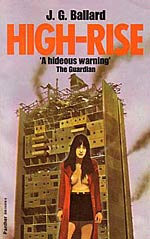
![]() BigEnk
BigEnk
1/4/2025
![]()
High-Rise is an analysis of complete social collapse within a self-contained and advanced luxury apartment complex. The strata of floors separate the tenets into three classes, yet all are wealthy enough to afford an apartment in the first place. The novel splits it's time between three different perspectives, one for each class. High-Rise begins with the last apartment being filled, as nearly everybody in the building is partying. Already there is friction between individuals, but it's minor, hardly something out of the ordinary in everyday life. The intensity of this friction ramps up over the chapters, as it seems to the characters that everybody is just waiting for an excuse, waiting for a mistake, to unleash their pent up id.
Ballard paints the scene of the tower so vividly; the slowly crumbling infrastructure and services that incite stress, and then the subsequent piles of refuse in the hallways, ubiquitous crass graffiti on the walls, makeshift furniture blockades in stairwells, entire floors completely devoid of electricity and running water. The tenets can leave the ever growing hellhole, but they begin to choose not to, choosing instead to wallow in their own filth and decay. I can picture it clearly because Ballard spends so much time detailing it. Yet I also think that he repeats the same examples a bit too frequently. I wish that he had been less reliant on the same motifs over and over again, even though those motifs are well drawn. It's also a disturbingly gruesome book that has scenes that left me revolted.
The tension and pacing is stunning. The escalation of violence is perfectly slow, to the point that you can't quite tell which event was the defining line between an outlier, and something that started the collapse. Ballard has excellent endings to chapters that are memorable moments looking back and were thrilling increases in tension that left me dying to read on. The prose is similarly strong, making for something that is both extremely readable without lacking style or depth.
The pacing is good in spite of Ballard's proclivity to lengthy bouts of metaphor and symbolism. Everything in High-Rise is seemingly a metaphor. Of course the book deals with social class and status, but it goes much deeper than that. The role of the structure that supports hierarchy in the oppression of lower classes, the ability to control our base instincts, tribalism, consumerism, and masochism to name a few. What Ballard really nailed was the quietly simmering violent tension that sometimes grows when there's an erosion of any sense of commons between people. That feeling of waiting for something to happen, something that you know will happen, and preparing yourself for it.
High-Rise is extremely memorable in a gnawing way that I see sticking in bits of my mind for a long time. One thing I can see is that it's certainly not for everyone. It's an acquired taste for sure, but I happen to like it a lot.